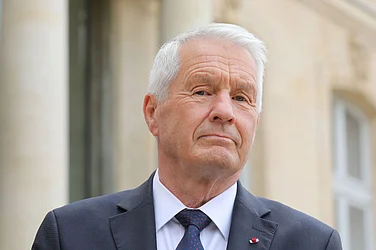France President Emmanuel Macron named the country’s youngest-ever prime minister and first openly gay one, Gabriel Attal, on Tuesday as he seeks a fresh start for the rest of his second term amid growing political pressure from the far right.
Attal’s appointment comes after sitting PM Elisabeth Borne resigned a day earlier, following a tumultuous term in office. Borne said in her resignation letter that she and Macron agreed “it was more necessary than ever to push on with reforms.” The former PM had also faced criticism for pushing through some unpopular reforms during Macron's second term.
The President will now work with Attal to name a new government in the coming days, five months ahead of the European Parliament elections.
Who is Gabriel Attal?
Gabriel Attal, 34, was originally a supporter of the Socialist Party but joined Macron’s centrist movement in 2016.
He rose to prominence as the government spokesperson during the Covid-19 pandemic from 2020 to 2022, when he would make frequent public appearances. He emerged as one of the most popular politicians, according to recent opinion polls, with some describing him as the ‘baby Macron’, according to a report by The Guardian.
He was appointed as the education minister last year. His first move was imposing a ban on the Muslim abaya dress in classrooms, claiming that the garments, which are mainly worn by Muslims, were testing secularism in schools – a decision that many conservatives appreciated. He also launched a plan to experiment with school uniforms, as part of efforts to move the focus away from clothes and reduce school bullying.
Attal is also the first openly gay prime minister of France and is in a civil partnership with Stéphane Séjourné, a member of the European parliament for Macron’s Renaissance party.
Turbulent year for Macron
The president’s current term, which is his second, lasts until 2027, and he is constitutionally barred from a third consecutive term. The cabinet reshuffle is being seen as a boost for his popularity before the European Parliament elections in June.
‘’I know I can count on your energy and your commitment,” Macron posted on the social media platform X in a message to Attal.
He also wrote that he was counting on Attal’s energy and engagement to restore the spirit of 2017 – the year of Macron’s first election when he promised to revolutionise French politics.
Attal’s appointment comes at a time when Macron continues to face pressure after he signed the unpopular pension and immigration reforms in 2023. The turbulent year witnessed large-scale protests against Macron’s decision to raise the state pension age from 62 to 64 and tougher restrictions on obtaining residency and citizenship – a move that the right termed as their ideological win.
The trouble began in 2022. In April of that year, Macron defeated far-right candidate Marine Le Pen to be the first French president to win a second term since Jacques Chirac in 2001. However, shortly after being re-elected, Macron’s centrist grouping (Ensemble) lost its absolute majority in Parliament, winning just 245 seats, when 289 are required for an absolute majority.
This meant that any reform that Macron wanted to push, required multiple rounds of negotiations with the opposition and the right.
Far-right leader Marine Le Pen’s National Rally party scored a ten-fold increase in its seats by winning 89 seats. A broad left-wing alliance, NUPES, united behind left-wing veteran Jean-Luc Melenchon, emerged as a prominent opposition group after it won 131 seats.
How will this cabinet reshuffle help Macron?
The European Parliament elections are five months away at a time when there is widespread public discontent over surging living costs and the failure of European governments to curb migration flows.
During the handover ceremony, Attal said his goals include making security an “absolute priority” and promoting values of “authority and respect of others.” He also vowed to strengthen public services including schools and the health system and push for “better controlling immigration.”
But opinion polls show the president trailing far-right leader Marine Le Pen’s party by around eight to 10 percentage points, according to a report by Al Jazeera.


























